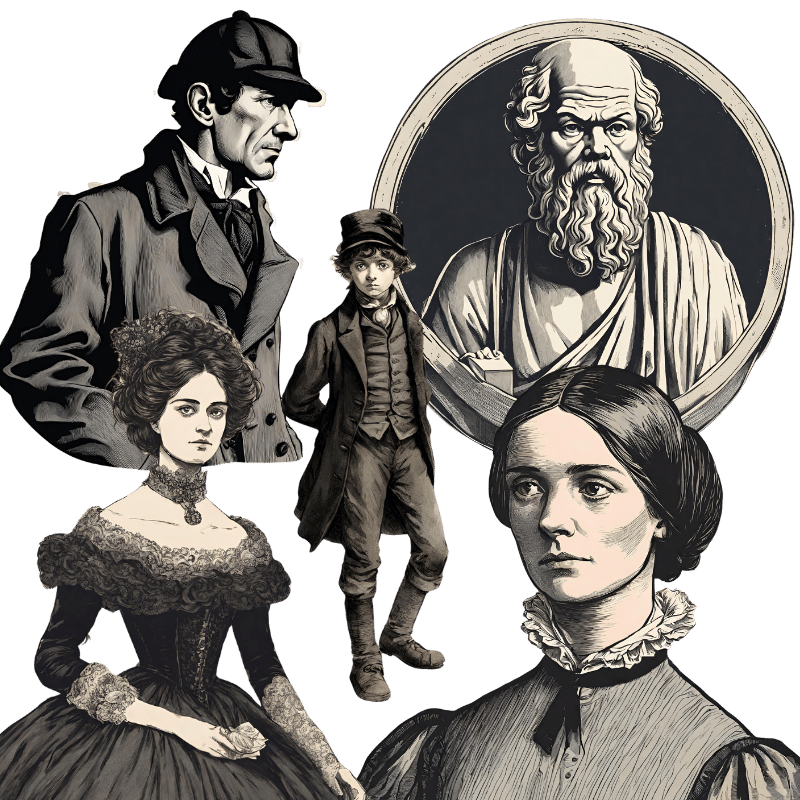
A lot of people today see classic literature as outdated or irrelevant since we’re always online and have endless entertainment options at our fingertips. Who’s got time for stuff written centuries ago, right? But the classics deserve more credit than that. Look at how famous and influential those old books, plays, and poems still are – there’s something valuable there for us modern readers too.
Ever wondered why certain stories withstand the test of time while others fade into obscurity?
In this article, I’ll explore some of the main reasons delving into classic literature is worthwhile, even in our tech-driven world. From cultural insights to mental stimulation, classics continue to reward readers who take the time to fully immerse themselves in deeply engaging narratives that have captivated audiences for generations.
- Cultural Influence:
- Many popular movies, shows, and games are inspired by classics.
- Famous plays and novels have had a significant impact on modern pop culture.
- Classic stories subtly influence new creative works, providing a solid foundation for new ideas.
- The Human Condition:
- Classics offer novel cultural insights and historic context.
- Readers often have “aha!” moments, realizing that classics articulate what they already knew but couldn’t express.
- Classics validate core truths and give structure to shapeless notions, making them powerful and moving for readers.
- Timelessness:
- Classics endure over generations and maintain cultural relevance.
- They tap into universal human truths that still resonate today.
- Unlike much modern content, classics aim for artistic merit and challenge minds.
- The ability of classics to start important conversations and find new readers demonstrates their lasting impact.
Contrary to popular belief, classics aren’t boring or hard to understand either. Novels, plays, and poems from past eras can really get your brain juices flowing and spark your imagination. They also give new perspectives on what it means to be human. Stories like Pride and Prejudice, Romeo and Juliet, and The Great Gatsby touch on themes that are still highly relevant today, even though they were written a long time ago.
In this article, I’ll explore some of the main reasons delving into classic literature is worthwhile, even in the modern world. From cultural insights to mental stimulation, classics continue to reward readers who take the time to fully immerse themselves in deeply engaging narratives that have captivated audiences for generations. So pour yourself a cup of coffee, get cozy, and let me convince you that cracking open an old book could be just what you need to disconnect from screens and rediscover the simple pleasure of a great story.
Cultural Influence
Some of the biggest movies, shows, and games we enjoy today wouldn’t even exist without classics planting the seeds. It’s wild how influential old books have been on modern pop culture.
Think about it – how many of your favorite movies are straight-up retellings of famous plays and novels? West Side Story was inspired by Romeo and Juliet, Clueless took cues from Emma, and Pride and Prejudice has had like a million adaptations over the years. Game of Thrones pulled from all sorts of epic classics too.
And that’s not even getting into all the subtle ways classic stories seep into new creative works. How many times have you watched a movie and thought “hey, this reminds me of…”? Chances are there’s a literary influence you’re not quite putting your finger on. Mythological tales especially left a huge mark – you’ll find nods to Greek myths in stories like Percy Jackson, and references to Norse legends pepper everything from Assassin’s Creed to Marvel comics.
Creators nowadays definitely stand on the shoulders of giants. They remix familiar scenarios, characters, and themes that were first imagined long ago. Even if the delivery is different, classics offer a solid foundation to spring new creative ideas from. And as an audience member, being “in” on those connections makes the experience that much richer.
So next time you consume something and think “This is really familiar…,” take a moment to trace it back to the book it might be inspired by. You’ll gain a whole new appreciation for how the past truly shapes our present in the world of storytelling. The classics keep on giving!
Every Era Of The Human Condition
A lot of people assume when you read classics, you’ll learn whole new profound ideas and information you never would’ve encountered otherwise. And to be fair, the classics do often provide novel cultural insights and historical context you can’t get elsewhere.
However, what I think is even more interesting is how sometimes when you read classics, you experience a “aha!” moment of realizing the book said something you already kinda knew deep down – it just said it way better than you ever could’ve articulated yourself.
Classics are books which, the more we think we know them through hearsay, the more original, unexpected, and innovative we find them when we actually read them.
– Italo Calvino
It’s like the book put words to feelings and thoughts you had your whole life but never fully understood. Suddenly it all clicks into place and makes crystal clear sense as you’re reading a passage. The classic validated a core truth you sensed inside for a long time.
I think moments like that are what make classics really extraordinary – they manage to articulate fundamental human wisdom we all intuitively grasp but lack the skill to properly express. The classics said it first for sure, but sometimes you discover within their pages whole new appreciation for ideas you’ve held your whole life. They put a name and structure to shapeless nebulous notions. And that’s incredibly powerful and moving for a reader to encounter.
Timelessness Of Good Stories
Stories that have endured for generations and continually resurfaced in new eras – those are the texts that have proved their timelessness.
It’s a major accomplishment for any piece of literature or art to maintain cultural relevance centuries after creation. The classics tapped into universal human truths that still resonate today, no matter how much the wider world changes. Their themes resonated with countless readers across wide swaths of history.
Meanwhile, so much modern content is quite disposable. In this era of rapid media consumption, publishers churn out novels that feel engineered more for a quick profit than to challenge minds or truly move culture in a lasting way. There’s nothing wrong with easy reads, but the true classics aim higher with their artistic merit and willingness to grapple with profound ideas.
Standing the test of literal time is the most objective sign available that a work transcended its original moment and will continue finding new readers. The greatest classics manage to start important conversations generation after generation. Their accessibility increased over the decades too, initiated by devoted readers spreading the infectious stories further.
In comparison, modern culture moves so fast that almost everything risks being forgotten within just a few years. But the classics propose questions and hypotheses about humanity that few works today can match for their scope and staying power. Their immortality says it all, really, about what literature can accomplish at its finest.
Find Your Next Book In The Classics
In summary, classic literature matters because of its cultural influence, its ability to articulate fundamental human wisdom, and its timelessness in resonating across generations. Classics offer valuable insights and continue to shape our culture and understanding of humanity.
